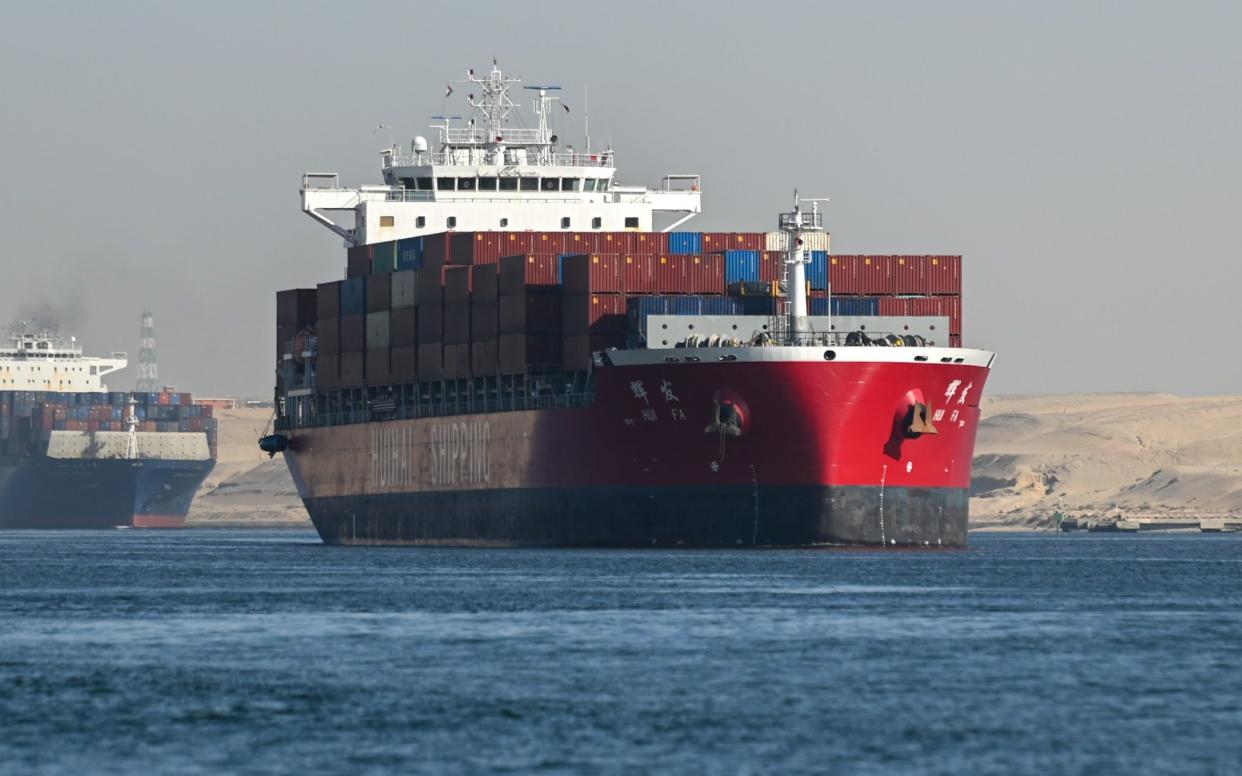Houthis vow to target British ships in Red Sea

- Oops!Something went wrong.Please try again later.
Houthi rebels said they would expand their targets to include US and British ships as they vowed to keep up attacks after coalition air strikes on their positions in Yemen.
British and American ships had become “legitimate targets”, Nasruldeen Amer, a spokesman for the Houthis, told Al Jazeera on Monday evening.
“The ship doesn’t necessarily have to be heading to Israel for us to target it, it is enough for it to be American,” said Mr Amer. “The United States is on the verge of losing its maritime security.”
The Houthis have previously said they would only target Israeli ships or those en route to Israel.
It comes after the rebels hit a US-owned vessel in the Red Sea earlier on Monday as Rishi Sunak warned of more military strikes.
The M/V Gibraltar Eagle, a Marshall Islands-flagged, US-owned and operated container ship, was struck by a missile near the coastal city of Aden in Yemen, causing a fire in the hold. No injuries were reported.
Ambrey, a British maritime security firm, said it “assessed the attack to have targeted US interests in response to US military strikes on Houthi military positions in Yemen”.
It came as the Prime Minister told MPs that he would not hesitate to order further military action if necessary.
“The threats to shipping must cease,” he said. “Illegally detained vessels and crews must be released. And we remain prepared to back our words with actions.”
In a statement following last week’s strikes on Houthi sites in Yemen, Mr Sunak said Britain acted in self-defence and to uphold freedom of navigation, adding that there was no evidence of civilian casualties.
“It was limited, not escalatory,” he said. “It was a necessary and proportionate response to a direct threat to UK vessels and therefore to the UK itself.”
Facing questions
Mr Sunak faced questions from Tory MPs over the reduction in the Armed Forces in recent years, with one saying the target of spending 2.5 per cent of national income on defence was not enough.
On Sunday, Qatar, which supplies gas to Britain, suspended shipments through the Red Sea as Houthi attacks escalated.
QatarEnergy, the world’s second-largest exporter of liquefied natural gas (LNG), halted tanker transits through the Bab el-Mandab strait and is considering rerouting ships around the Cape of Good Hope as the conflict deepens.
The move will increase concerns that longer travel times could increase prices.
The US military confirmed the latest attack, putting the blame on Yemen’s Houthi rebels.
“The ship has reported no injuries or significant damage and is continuing its journey,” a spokesman for US military central command said.
A Department for Energy Security and Net Zero spokesman said: “Global energy markets are continuing to function as normal following the recent attacks in the Red Sea.
“The UK has one of the largest LNG import capacities in Europe, as well as a diverse range of natural gas sources, including our own domestic production.
“We do not expect to see any disruption to UK gas supply in light of this recent announcement.”
The United Kingdom Maritime Trade Operations, which oversees Middle East waters, also reported that missile fire had struck a ship in the Gulf of Aden, about 110 miles south-east of the southern Yemen border.
Facing questions from MPs, Mr Sunak said: “I can tell the House today that our initial assessment is that all 13 planned targets were destroyed.
“We have seen no evidence thus far of civilian casualties, which we took great care to avoid.”
He added: “I do not take decisions on the use of force lightly. That is why I stress that this action was taken in self-defence. It was limited, not escalatory.”
Sir Keir Starmer, the Labour leader, said his party backed the “targeted action”, but warned that any military operation must be “underpinned by a clear strategy”.
In a move criticised by some opposition MPs, Mr Sunak announced the military action last week when Parliament was not sitting.
Strikes ‘bring risk’
Sir Keir has acknowledged that it is not always possible to hold a vote beforehand, but told Mr Sunak: “Scrutiny is not the enemy of strategy. Because while we back the action taken last week these strikes still do bring risk, we must avoid escalation across the Middle East.”
Mr Sunak said that he remained committed to parliamentary convention and precedent, but told MPs that the “need to maximise the security and effectiveness of the operation meant that it was not possible to bring this matter to the House in advance.
“But we took care to brief members before the strikes took place, including you of course, Mr Speaker, and the leader of the Opposition, and I have come to the House at the earliest possible opportunity.”
Sir Julian Lewis, Conservative chairman of Parliament’s intelligence and security committee said: “We certainly should not be reducing the numbers of frigates or destroyers and we certainly should not be mothballing or otherwise decommissioning our amphibious assault ships.”
Richard Drax, the Tory MP for South Dorset, said: “While it is important how we spend defence money, it is vital and without doubt that defence needs a lot more money, more than 2.5 per cent and these arbitrary targets, if our brave men and women are going to fight a sustained conflict in the years ahead.”
US forces shot down a missile fired by Yemen’s Houthi rebels at an American warship on Sunday, in the first confirmed attack of its kind since allied strikes on the group last week.
The anti-ship cruise missile was fired at the USS Laboon in the southern Red Sea and downed off the port city of Hodeidah, on Yemen’s west coast, by a US fighter jet.
No injuries or damage were sustained, the US military’s central command said.
At the time, Chinese, German and Turkish merchant vessels were passing through the area, according to Ambrey, a British maritime security firm.

Earlier on Sunday, the Houthis complained that US aircraft were observed flying close to Yemeni airspace and coastal areas. The group is yet to comment on the incident involving the USS Laboon, a destroyer.
The downing of the missile came after American and British forces began returning fire against the Houthis on Friday in response to the movement’s attacks on shipping in the Red Sea.
The Islamists had warned their response to the strikes in Yemen will be “strong and effective”.
Houthi attacks in the region have snarled commercial shipping through the key waterway, which accounts for about 15 per cent of global sea trade.
The Red Sea crisis has added to anxieties over a wider conflict in the Middle East beyond Gaza, where Israel is waging a campaign to annihilate the Palestinian terror group Hamas, which rules the strip and, like the Houthis, is backed by Tehran.
The Houthis, which gained control over most of Yemen after years of civil war, have framed their attacks in the area as an act of solidarity with the people of Gaza targeted at Israeli-linked vessels.
However, some of the ships they have attacked have no clear connection to Israel.
It is unclear what impact the British and US strikes have had on the group’s capabilities.
Led by the secretive Abdul Malik al-Houthi, the Houthis have amassed significant firepower in less than a decade,
Some experts believe they are now a formidable fighting force, backed by weapons and training supplied by Iran.
The attacks in the Red Sea have led shipping companies to divert vessels away from the area, forcing them to take a longer route around southern Africa instead.
Since Nov 19, the Houthis have carried out at least 27 strikes on cargo ships in the region.

